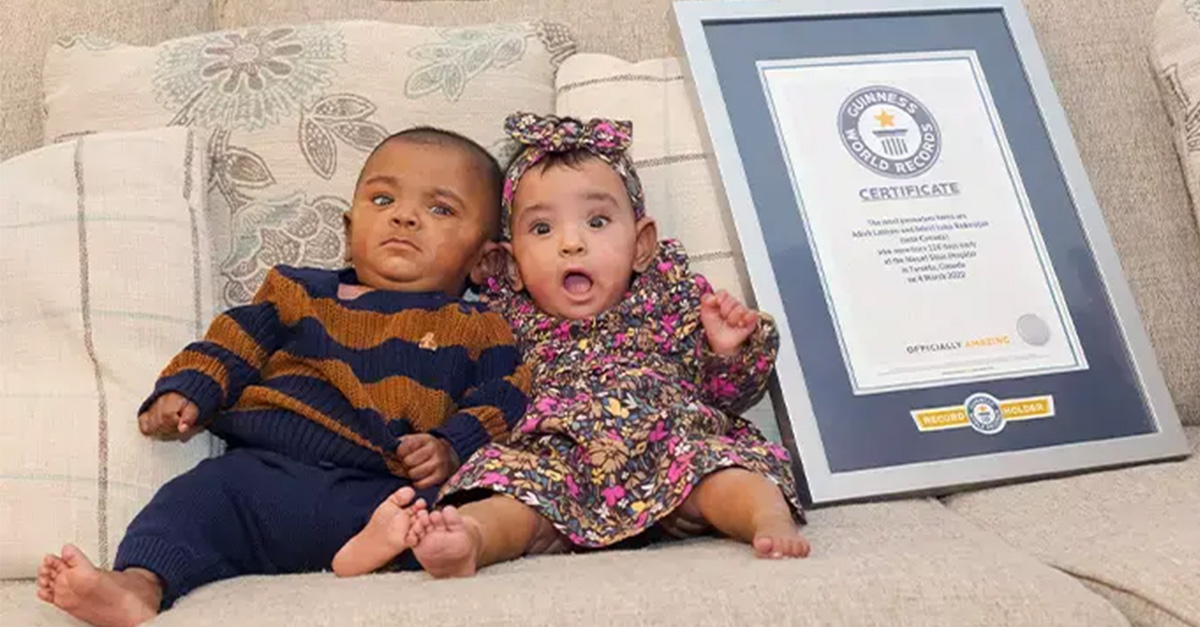


Get a free copy of Parental Rights & Education when you subscribe to our newsletter!

“They were born smaller than the palm of our hands…We’re amazed that our twins have the record title. But beyond that, what we’re happy about and passionate about is that this is going to help push the dialogue on viability. We do hope this is a record that gets broken.”
–SHAKINA RAJENDRAM, MOTHER
What a difference 90 minutes makes. Had Adiah and Adrial Nadarajah made their entry into the world just an hour-and-a-half earlier than they did, they probably wouldn’t be alive, much less celebrating a first birthday and recognition by the Guinness Book of World Records as the most premature and smallest surviving twins in history.
Their story is a miraculous one, brought about and shaped by a mother’s faith and persistence and a father’s prayers and belief that all children deserve every possible chance at life — no matter what their stage of development.
On March 2, 2022, Shakina Rajendram found herself going through every pregnant mother’s worst nightmare. At just 21 weeks and five days pregnant with twins, she suddenly went into premature labor. She was quickly taken to a local hospital, where not many months prior she had lost her first baby. Doctors and nurses, while sympathetic, told her that her twins — a girl and a boy — were not viable and that they had a 0 percent chance of survival.
As a result, she was told that no life-saving care would be provided; instead, the hospital would only allow “comfort care,” meaning Shakina could hold the babies until they died.
The prognosis was surreal, she now recounts, because “even in that moment, as I was hearing those words come out of the doctor’s mouth, I could still feel the babies very much alive within me. And so for me, I just wasn’t able to comprehend how babies who felt very much alive within me could not be viable.”
Shakina’s husband, Kevin Nadarajah, said he had tears streaming down his face while he prayed for hope for his children. After consulting an organization called “TwentyTwo Matters,” which advocates for micro-preemie babies, the couple learned that Mount Sinai Hospital in Toronto had a neonatal unit that specializes in assisting babies born at 22 weeks’ gestation. Most Canadian hospitals won’t provide medical care until 24 to 26 weeks’ gestation.
Shakina and Kevin lobbied for and got their transfer, but on arrival, they were told by Mount Sinai providers that the hospital would not provide any life-saving measures for the babies if they were born even a few minutes before 22 weeks. They also warned that even if the twins were provided care they would likely still die.
Shakina fought throughout the day to prolong the birth and help the twins make it to 22 weeks. She fell asleep shortly before midnight and at 12:15 a.m. her water broke. An hour and a half later, the two twins, Adiah Laelynn and Adrial Luka, were born. The hospital immediately began resuscitation and providing the necessary neonatal care.
Adiah weighed 0.72 pounds when she was born. Her little brother, born 23 minutes later, weighed 0.92 pounds.
Being born and taken to the neonatal intensive care unit (NICU) were just the first major hurdles the twins passed, as they would both still have to experience a rough road of hospital stays and medical treatments to grow in strength and health. As the children dealt with various health challenges, even nearly dying on several occasions, doctors advised the parents to consider withdrawing medical support.
Shakina and Kevin, though, refused to give up on their children. They spent hours every day with the babies, holding their hands and singing. Kevin said,
“I would say to other parents going through the NICU journey, just being there, being present for your babies, makes a huge difference on the outcomes. Speak positive words to them. Tell them about how much you love them. Tell them about all of the things you hope, and you dream for them. Be brave to stand up and advocate for what your babies need.”
Six months later, the twins left the hospital and went home. Though Adrial was admitted to the hospital two more times, both are now doing well and meeting all milestones expected of babies their age. On March 4, 2023, the two celebrated their first birthday. Among the presents was a framed Guinness World Record certificate for being the world’s most premature surviving twins. At a combined birthweight of 1.65 pounds, they also rank as the lightest twins at birth.
Shakina and Kevin, both devout Christians, say they believe that unceasing prayer, by family, friends, and other Christians from around the world, is what helped the twins to survive. “The babies were close to death so many times, and as people prayed, things would miraculously change,” Shakina explained.
Adiah is now 13.2 pounds, and “she’s an extremely happy and social baby and smiles all day long. She is very chatty and has ‘conversations’ with us and her toys for hours,” Shakina says. Her little brother weighs more than her, and his mother describes him as observant and intelligent.
“They were born smaller than the palm of our hands. People still don’t believe us when we tell them,” Shakina stated. “We’re amazed that our twins have the record title. But beyond that, what we’re happy about and passionate about is that this is going to help push the dialogue on viability. We do hope this is a record that gets broken.”
Though Adiah and Adrial are the most premature twins to make it to their first birthday, they are not the most premature baby to reach that happy event. Curtis Means was born at 21 weeks plus one day. Although, his twin sister, C’Aysa, did not survive, little Curtis is now thriving.
Babies like Adiah and Adrial and Curtis blow up the pro-abortion industry’s contention that babies in the womb aren’t really “human” until a certain point in the pregnancy. Some medical providers and many lawmakers still consider viability to be 24 weeks, but there are now so many surviving preemies born before that point that it’s clearly just an arbitrary number.
A baby is no less a baby before 24 weeks simply because they might have to have more medical attention. Many states are even flying past the viability restriction, legalizing abortion up to the moment of birth, without any concern for the likelihood of survivability or the horrific pain that child will experience.
What Shakina said in terms of what she thought when the doctors told her that her babies were not viable should serve as a message to lawmakers. Any baby, moving about in the womb, is a person. In this case, they were two babies, two persons, alive and kicking. Nothing changed about Adiah and Adrial when the clock finally turned on their 22nd week, just like nothing changes when a child reaches 24 weeks. Nothing about that moment suddenly changes the life in the womb or the humanity of the baby. Nothing changes either when a child is born; the baby who was in the womb minutes ago (and who could still be aborted if his mother is in, say, California) is the same baby as the one now being held in his mother’s arms.
People must stop acting as though these markers mean something in order to justify and uphold abortion. God creates life, and each person should be valued and cared for — from the moment of conception.
Psalm 139:13-16 states,
“For you formed my inward parts;
you knitted me together in my mother’s womb.
I praise you, for I am fearfully and wonderfully made.
Wonderful are your works;
my soul knows it very well.
My frame was not hidden from you,
when I was being made in secret,
intricately woven in the depths of the earth.
Your eyes saw my unformed substance;
in your book were written, every one of them,
the days that were formed for me,
when as yet there was none of them.”
Those words were written by David, a warrior and a king, but they also apply to world record holders Adiah and Adrial Nadarajah and Curtis Means. What’s more, those words apply to every other baby, born and unborn, no matter their race, sex, abilities, or station in life. Whether they are wanted by their mothers or not, God loves each and every one of those babies, and they all deserve a fighting chance at life.
Ready to dive deeper into the intersection of faith and policy? Head over to our Theology of Politics series page where we’ve published several long-form pieces that will help Christians navigate where their faith should direct them on political issues.
